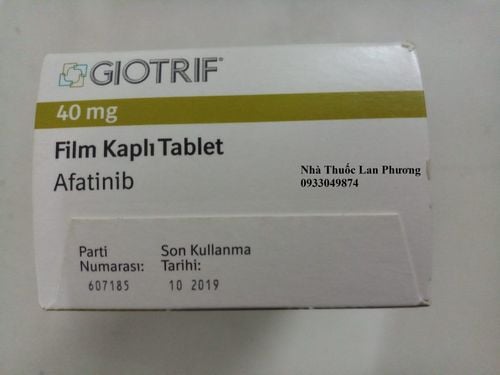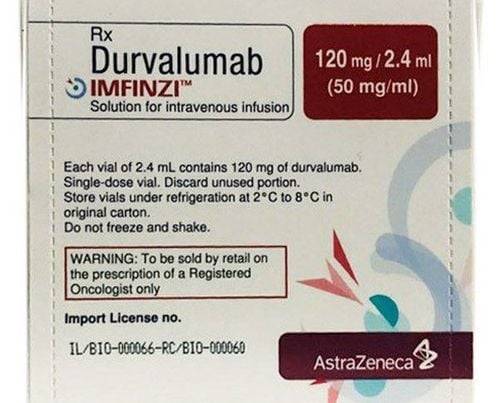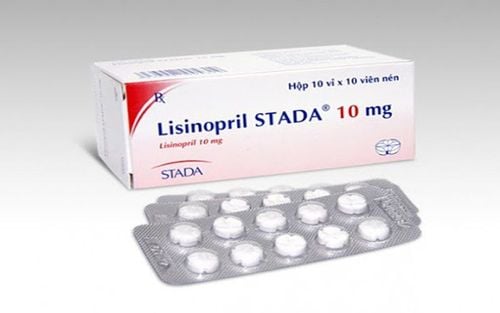This is an automatically translated article.
Gilotrif is effective in the treatment of advanced stage lung cancer, with locally advanced or metastatic non-small cell cancer with mutations in the epidermal growth factor receptor gene in adult patients and have not been previously treated with an EGFR tyrosine kinase inhibitor.
1. What does Gilotrif do?
What does Gilotrif do? Gilotrif drug, also known as afatinib, is effective in the treatment of locally advanced or metastatic non-small cell lung cancer with mutations in the epidermal growth factor receptor gene in adult and pre-existing patients. that have not been treated with an EGFR tyrosine kinase inhibitor.
Lung cancer is one of the leading causes of cancer death in men and women. About 85% of lung cancers are non-small cell cancers with genetic mutations. In particular, Gilotrif is a tyrosine kinase inhibitor that helps block proteins that promote the growth of cancer cells, especially those with genetic mutations.
2. How to use Gilotrif
Gilotrif is prepared in the form of 30mg film-coated tablets, dark green in color and round shape. Therefore, Gilotrif is to be taken by mouth as directed by your doctor, usually once daily at least 1 hour before or 2 hours after a meal. Dosage is based on your medical condition, response to treatment, and other medications you may be taking. Therefore, tell your doctor and pharmacist about all products you are using including prescription drugs, over-the-counter medicines and herbal products.
Use Gilotrif regularly to get the most benefit from it. Never increase the dose or abuse the drug for longer than prescribed. This not only makes the condition improve faster, but also increases the risk of unwanted effects.
3. Undesirable effects of the drug Gilotrif
Some unwanted effects of Gilotrif medicine include:
Blurred eyes Mouth sores, redness and swelling of lips Dry skin, itchiness Acne Nosebleed, runny nose Nausea, vomiting Loss of appetite Diarrhea: diarrhea Persistent may lead to dehydration, abnormal decreased urination, dry mouth, heart palpitations, dizziness, lightheadedness. Serious side effects: signs of eye disease (change in vision, red/painful eyes, photosensitivity), signs of low levels of potassium in the blood (eg, muscle cramps, weakness) , irregular heartbeat), signs of a bladder infection (eg, burning, pain when urinating, urgent or frequent urination, fever), signs of a bladder infection (burning when urinating, urgency, urinating more often, fever), signs of skin infection around fingernails or toenails (irritated skin, redness around fingernails, change in nail color). Liver disease: Gilotrif can rarely cause serious liver disease or tear the stomach or perforate the intestines. However, when there are signs such as dark urine, nausea, persistent vomiting, loss of appetite, stomach pain, yellow eyes,... notify your doctor immediately.

Thuốc Gilotrif có thể gây ra tình trạng chán ăn cho người sử dụng
4. Some notes when using Gilotrif
Some precautions when using Gilotrif include:
Allergy notice: Gilotrif drug products may contain inactive ingredients, which can cause allergic reactions or other problems. Report any medical history, especially of kidney, liver, or stomach problems (eg, peptic ulcer, diverticular disease), eye disease (eg, dry eye, keratitis), or use of contact lenses round. The medicine can cause blurred vision, so do not drive, use machines, or do any activity that requires clear vision until you are sure you can do them safely. safe. Limit alcoholic beverages while using Gilotrif. Using Gilotrif may make your skin more sensitive to the sun's rays. Therefore, drug users should limit their time in the sun, avoid exposure to skin bleaching agents and sunlight. Use sunscreen and wear protective clothing when outdoors, and tell your doctor about sunburn or skin redness. Before surgery, tell your doctor or dentist about all the products you are using, including prescription drugs, over-the-counter medicines, and other products made with herbs. Do not use the drug for women who are pregnant or intend to become pregnant, because the drug can be absorbed through the skin and lungs and can harm the fetus even if dust from the gilotrif tablets is inhaled. It is especially important to avoid pregnancy while taking this medicine and for at least 2 weeks after treatment. Therefore, use forms of contraception such as condoms and birth control pills during treatment and for at least 2 weeks after treatment ends.
For women who are breastfeeding, gilotrif may pass into breast milk and pose a risk of harm to a nursing baby. Therefore, breastfeeding is not recommended while using gilotrif and for 2 weeks after stopping it. Consult your doctor before breast-feeding while using gilotrif. In addition, some tests should be done before you start treatment, to check for EGFR protein in the tumor. Tests such as liver function tests should be performed periodically to monitor disease progression and check for undesirable effects.
If you forget to take a dose of gilotrif, take it again as soon as possible. However, if it is close to the time you remember to take your next dose, skip the missed dose and take your next dose at the same time. Absolutely do not use twice the dose according to the treatment regimen. Using an overdose of Gilotrif can cause serious symptoms such as nausea, vomiting, stomach pain, severe dizziness, weakness,...

Hãy thông báo với bác sĩ kê đơn thuốc Gilotrif về các tình trạng bất thường
5. Gilotrif drug interactions
Drug interactions can reduce the effect of Gilotrif, or increase the effect of unwanted effects. Tell the doctor about all other medications the patient takes, including prescription, over-the-counter and herbal products. Do not start, stop, or change the dose of any medicine without your doctor's consent.
6. How to store Gilotrif
Store Gilotrif at room temperature, away from moisture and light. Do not store Gilotrif in a humid place or in the freezer. Each medicine will have different storage methods, so read the Gilotrif storage instructions carefully on the packaging, or ask your pharmacist. Keep Gilotrif out of the reach of children and family pets. When medicine is past its expiration date or cannot be used, dispose of it properly. Do not arbitrarily dispose of Gilotrif into an environment such as a water pipe or toilet unless requested to do so. Ask your waste disposal company or pharmacist for advice on how to safely dispose of Gilotrif to help protect the environment.
In summary, the drug Gilotrif, also known as afatinib, is effective in the treatment of locally advanced or metastatic non-small cell lung cancer with mutations in the epidermal growth factor receptor gene in patients. adults and have not been previously treated with an EGFR tyrosine kinase inhibitor. However, drugs can cause some unwanted effects and drug interactions, so tell your doctor what medicinal products you are taking to reduce the risk of side effects and increase the effectiveness of treatment. .
Please dial HOTLINE for more information or register for an appointment HERE. Download MyVinmec app to make appointments faster and to manage your bookings easily.
Reference source: webmd.com












